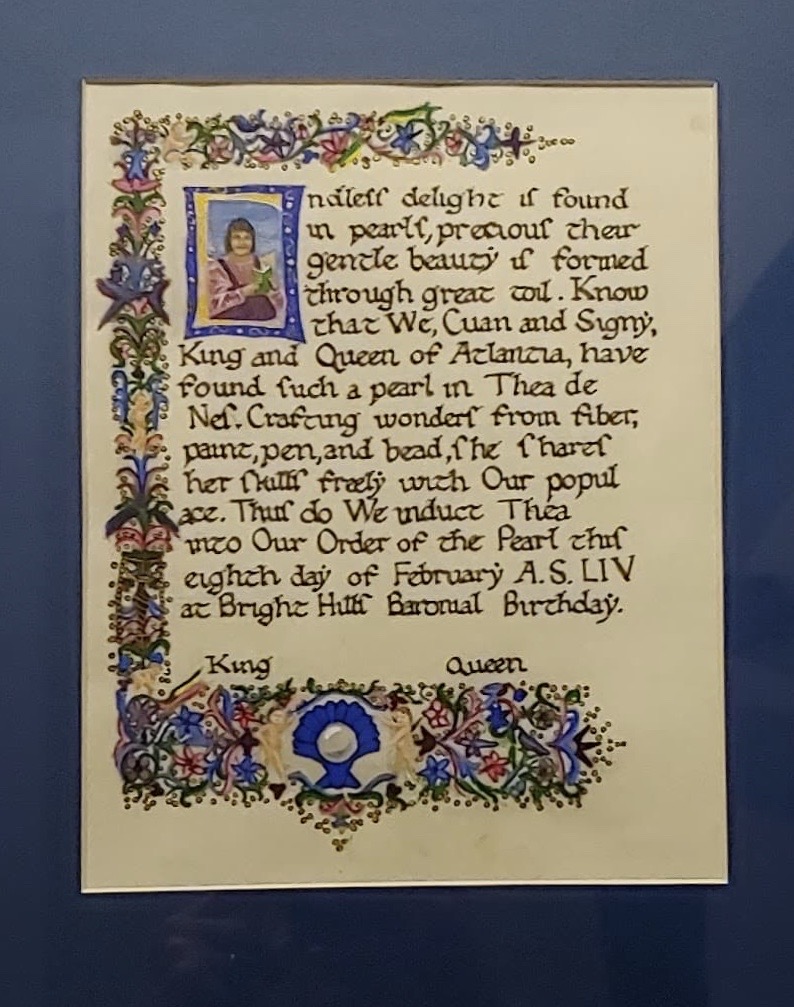A Sestina on a Journey
a new poem for Poeta Atlantiae 2021
upon the Coronation of Eckehard and Jane
a new poem for Poeta Atlantiae 2021
upon the Coronation of Eckehard and Jane
a new poem in the style of Old English alliterative verse
for Poeta Atlantiae 2021
upon the Coronation of Eckehard and Jane
When Hakon hábrok was placed on vigil to consider joining the Order of the Chivalry, I joined the Worthies to speak as a member of the populace. I was deeply honored to be asked to deliver this speech, and since Hakon is also a bard, I had to give it in verse. The verse itself is fairly loose Old English alliterative verse; I played with both line-length and alliterative structure to best suit the message.
From Ealawynn Maeru, alias Ela –
Gracious greetings, guests and friends.
Peers do plead their pieces of wisdom,
but I proclaim proudly for the populace.
What should the chivalry show us in deeds?
What weighs more worthy than wielding arms,
swift swords swinging ably,
all adversaries overwhelmed in battle?
No – a knight must be more—
prowess is purely part of the whole.
So what should the chivalry show us in deeds?
Listen, with silent lips and unlocked ears.
Contemplate, consider, and consult counsel;
weigh wisdom and wield caution.
Ignore self-interest; favor insight—
then speak, and lead.
This calling of chivalry is an arduous quest.
Many folk fail this formidable task.
But Hakon hábrok holds these!
Contemplation, counsel, consideration, and discernment:
if these uncommon attributes are the essence of chivalry,
then I call Hákon hábrok “knight.”
Elevate him to that order promptly.
The populace praises it as proper and just.
When Korrin Valravn asked me to write the text for Lucy of Wigan’s Coral Branch (AoA-level arts award), I lept at the chance, as Lucy is a dear friend.
Korrin had already selected the exemplar (a copy of Dante’s Inferno, MS Vat. lat. 4776, fol. 13r; Canto 4, ll. 64-87). This is a version of the Inferno with intensive planned glossing by Jacopo della Lana that had come up in conversation with Lucy when talking about glossing on legal texts. Glossing my own poem would be weird for a scroll, though, so Korrin brilliantly suggested I write a story to take the place of the glossing. To preserve the structure of the glossing and the layout of the exemplar, I decided that the story would incorporate lines of the poem.
The poem itself is hendecasyllabic meter (eleven syllables per meter) in terza rima (a rhyme scheme of ABA, BCB, CDC, etc.), which is the same structure as the Inferno. The prose interpolates lines of the poem in place of each glossed line in the original. Each section is approximately the same length as its respective gloss, which I achieved by taking a rough count of words in the exemplar and editing myself heavily. While the three animals in the poem (leopard, lion, and wolf) are pulled from the first canto of the Inferno, I twisted them towards Aesop’s Fables while also pulling heavily from forest episodes in chivalric romances. I also included an oblique reference to Dungeons and Dragons, as Lucy and I play together.
Hear, how midway in the journey of our lives,1
great merit and worth were discovered that we,
King Anton and Queen Luned, must recognize.
In Atlantia’s northern lands, fair and free,
dwells Lucy of Wigan in Roxbury Mill,
where with modesty she makes marvelously
her diverse delights with dedicated skill.
To list them all is a task most punishing
she creates with fiber and food — and more still!
Knitting and naalbinding, weaving and sewing —
sparing time for a dance, for Lucy loves balls —2
then to the garden, as greens need gathering.
Oft from her kitchen tempting fragrances call:
desirable dishes waft deliciousness,
while smooth libations sate all friends in her halls
Her subtlest arts remain; these are priceless:
We exclaim her judgment, mirth, and courtesy,
but the greatest of all her gifts is kindness.
Now induct her into that high company
of the Coral Branch! It is justly called for,3
and done by our hand and our Royal Decree,
For Lucy we laud, adulate, and adore,
in Anno Societatis Fifty-Five
on April the Tenth at Valencia Court.
Hear, how midway in the journey of our lives,
of that time when Lucy of Wigan was seized with a need to adventure, setting forth from the safety of her manor.
In Atlantia’s northern lands, fair and free,
Lucy set forth down the straight way into dark woods, until she came upon a leopard trapped in vines. Parched and near dead, it begged her to share her cordial, but Lucy knew a sip would not sustain the leopard — so she cut it free. It thanked her for her kindness, and she went onward. Soon she came to a lion weeping under a willow-tree. Once a prisoner, it had paid for its freedom with its mane. She could not bear its distress, so she sat—
Knitting and naalbinding, weaving and sewing—
with her diverse skills creating a new mane for the lion. Fastening the mane around the lion’s neck, she assured it of its handsomeness, with or without a mane. She left him gladly preening into a pond. As night grew closer, she came upon a starving wolf lying in the path. It whimpered pitifully, and Lucy was reminded of her own stomach rumbling when
Oft from her kitchen tempting fragrances call,
enticing her to taste the fine fare before it was finished. Kneeling, she offered a meat pie to the hungry wolf, who gladly took it. Soon it fell asleep, and she went onward. At last, she found herself in a grove where starlight reflected from every surface, for each leaf was of silver, bronze, and gold, and each branch of amber, diamond, and coral.
“Her subtlest arts remain; these are priceless,”
a sweet voice sang out; a luminescent figure stood in the middle of the grove. “You entered a forest, thick-crowded with troubles.4 Though you could have passed without a trace, you stopped for each creature that needed you, helping as you could.
For Lucy we laud, adulate, and adore;
A poet among poets would not have words to describe all you have done for those you have helped. You have done many works, with fiber, food, and flower.” The forest glowed gently around the figure, who plucked a twig of coral from a nearby tree. She extended it to Lucy, who knew then that the moon had come down to test and reward her. “But moreover, you were kind.”
1 Hear, how midway in the journey of our lives: This line is taken almost exactly from the first line of the Inferno, which begins (depending on the translation) with “Midway upon the journey of our life.”
2 Lucy loves balls: This is a joke that started at the first Pennsic Lucy went to, where she was very excited about the number of dances in the evening. We’ve all rather leaned into it.
3 of the Coral Branch! It is justly called for: This line and the following verse had to be changed, as to get me to attend Court for my Pearl, Korrin told me that Lucy was receiving her Coral Branch a week before she actually did. I had written the poem to include the date and the previous event, so I had to revise a few of the lines. Luckily, they were fairly straightforward to revise, and actually improved the final verse!
4 a forest, thick-crowded with troubles: This line is an adaptation from Canto 4, l. 64 of the Inferno (a line from the exemplar), which is sometimes translated as “a forest…thick-crowded with ghosts.”
Calligraphy and illumination by Korrin Valravn
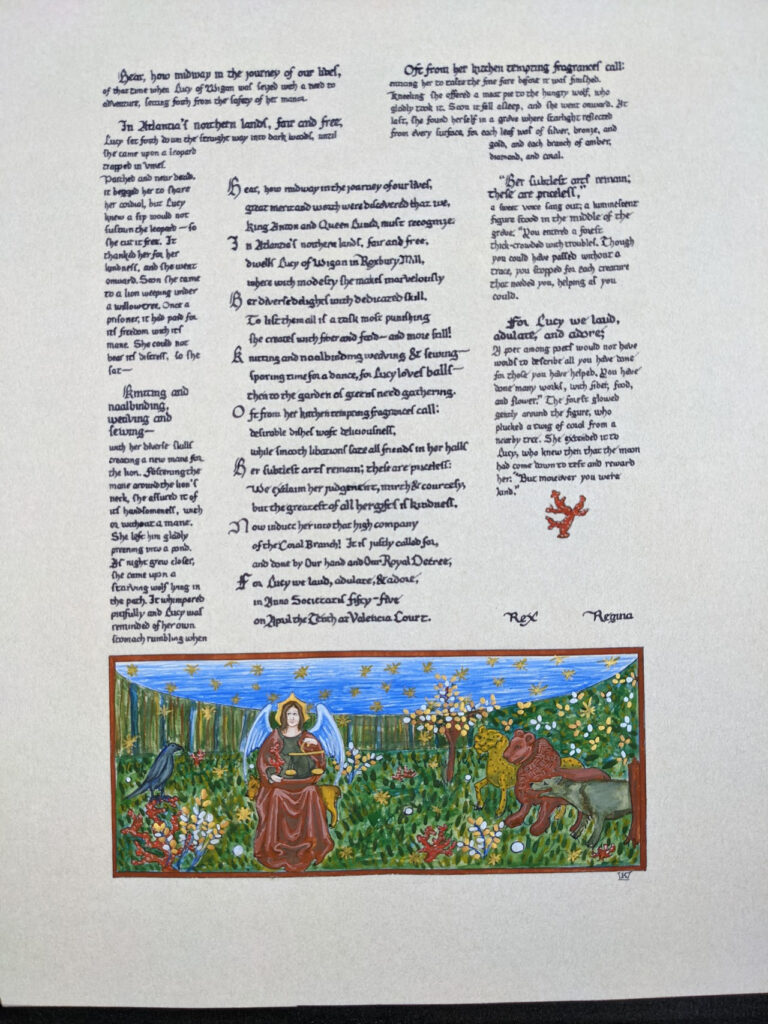
Dartmouth Dante Project. Dartmouth College. https://dante.dartmouth.edu/
Institute for Advanced Technology in the Humanities. The World of Dante. http://www.worldofdante.org/inferno1.html
I was honored to write the scroll text for Baroness Catalina Riquel de Luna and Baron Jean Maurice le Marinier’s court barony scrolls, presented at Kingdom Arts and Sciences Festival 2021. Korrin Valravn planned two beautiful maps for them, inspired by Dutch map from the 1570s. To match, I wrote two sonnets inspired by Pieter Corneliszoon Hooft, a Dutch poet from the 16th/17th centuries. His sonnets followed the rhyme pattern ABBA ABBA CCD CCD, and mine did the same. I was particularly pleased that I was able to include all the required information (dates, event, and heraldic blazon) within the poems themselves.
On March the Sixth, A.S. Fifty-Five, we hear
of service, strength, and grace at the edge of the sea
that guided barony, people, and crown most diligently:
the siren who sings of the rainbow over water.
Her righteous voice shimmers in salty air
for many years, serving Marinus surely.
Now is respite, reprieve, and relief from duty,
but Anton and Luned, King and Queen, declare:
“Catalina Riquel de Luna, your monarchs choose
you as Baroness of Our Court. Now use
and display with pride and privilege a coronet baronial.
Grant also arms: ‘Or, four pallets gules,
on a chief vert, three melusines argent.’ Thus ruled
at Atlantian Kingdom Arts and Sciences Festival.”
Hear from Queen Luned and Anton the King
of watery dangers, beauties, and beasts so bountiful
and a sailor and warden steadfast, brave, and faithful.
An excellent ship the Mariner was trusted with guiding.
Now finished, deserved shore-leave is softly calling
and he descends from ardent duty without proper label.
Loathe are we to have him leave Our table,
and thus his fervent service We must be rewarding.
On the Sixth of March, A.S. Fifty-Five, decree
Jean Maurice le Marinier “Baron,” and guarantee
the privilege to use and display a coronet baronial
and grant him arms: “Purpure, a seahorse contourny
Between three fleurs-de-lys Or.” Thus we agree
at Atlantian Kingdom Arts and Sciences Festival.
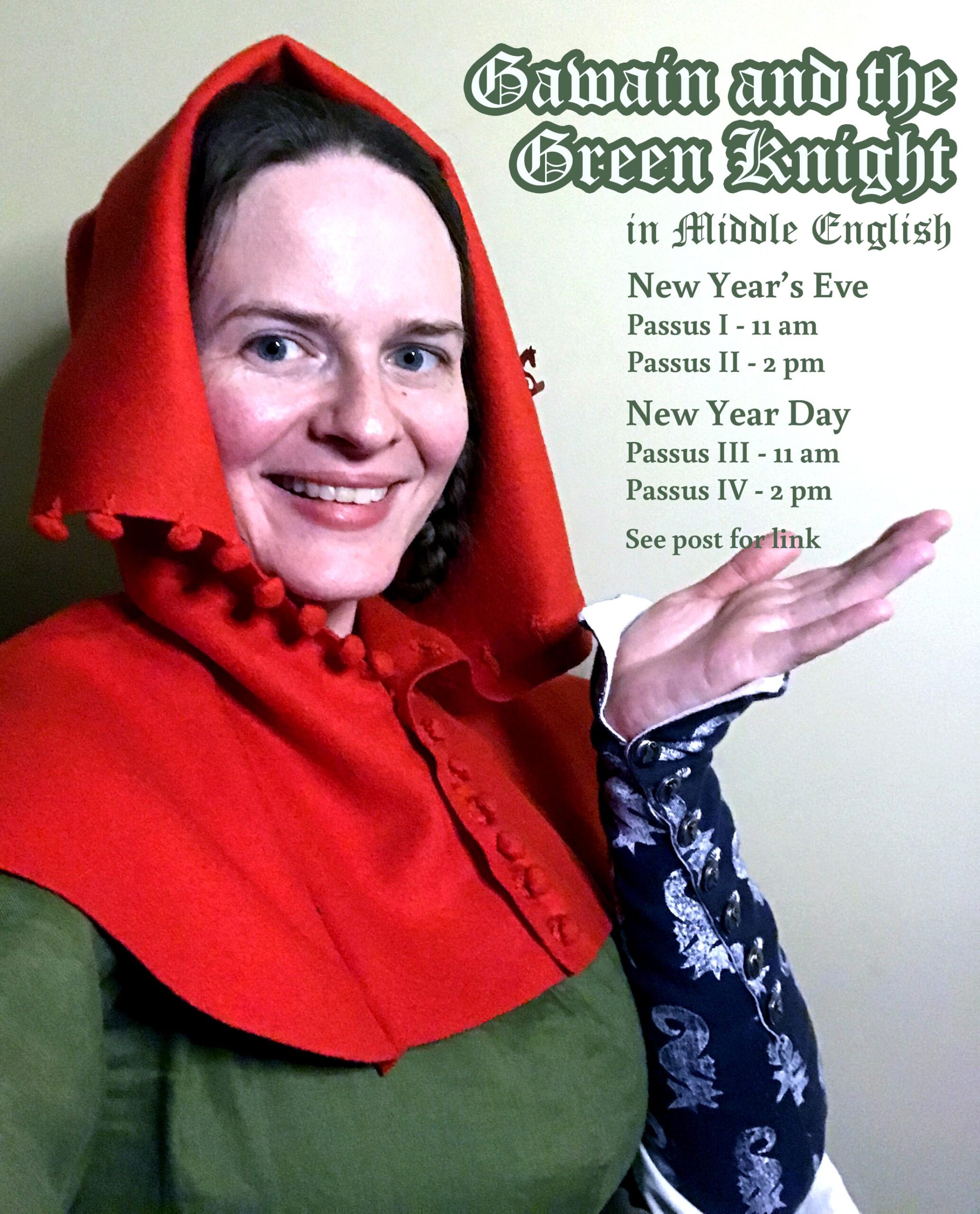
For a long time I’ve wanted to make reading Gawain and the Green Knight into an annual tradition around the New Year, as the poem itself is placed around the New Year.
However, 2020 was a long year, so I wanted to share it with others. At the beginning of the panic I read the entirety of Beowulf in Old English via impromptu streams on Facebook. This time, for Gawain, I made a long recording in garb (with new appropriate accessories!) and premiered it on New Year’s Eve and New Year Day. The videos are permanently on YouTube, so you can watch the whole playlist here or watch the videos via the embeds below.
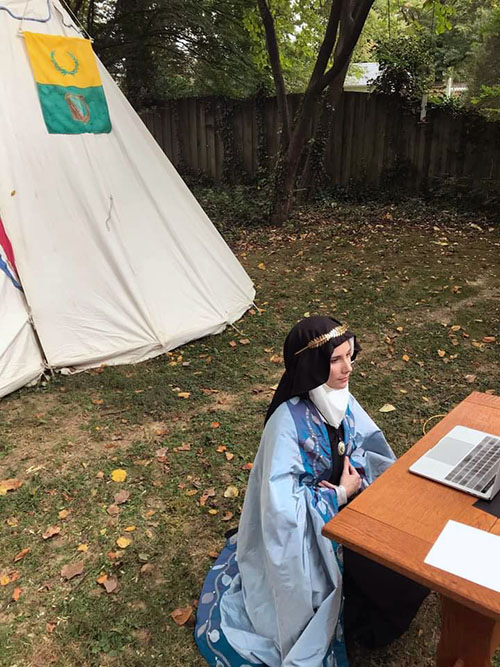
When I found out that Iselda de Narbonne was going to receive her Laurel, I may have demanded to make her mantle. I don’t know. It’s all a little fuzzy.
Due to life, the timeline on construction got a little tight, so the foundation seams were all machine sewn. However, every single visible stitch was hand-sewn, and the applique and beads were done entirely by hand. The fabric and thread is 100% silk. Every fabric used is a two-tone that shimmers when in motion, some more subtly than others. The pearls are glass Swarovski pearls.
I was asked to say something about the mantle as it was presented to her, but initially all I could think of was “A badass bard deserves a badass mantle, and I hope this makes you cry.” However, inspiration struck two nights beforehand, so I wrote her a poem that I read:
From sweet soil sprouts the laurel,
But limbs and leaves with labor grow
dewy drupes. Devotion and time
Furnished fruits fair to the ear,
Foliate and flourishing, brought forth
Verdant voices in choral concordance.
Now a mantle marks the mastership attained
Proclaims to peers: perceive this Laurel
with seeds of song to sow and nourish.
Amang ic seowede nihtlang ic sticode me foroft.
Æt þære wæfersyne wundormentles, þīn wopdropum ic ahope.
The last two lines, in Old English, translate directly to “While I sewed through the night, I stabbed myself often. At the spectacle of the wonder-mantle, I hope for your tears.” In other words, “I hope it makes you cry.”
|
|
|
|
|
|
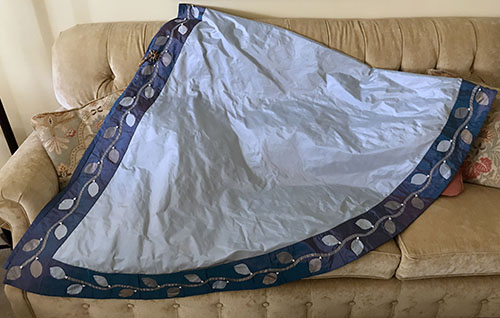
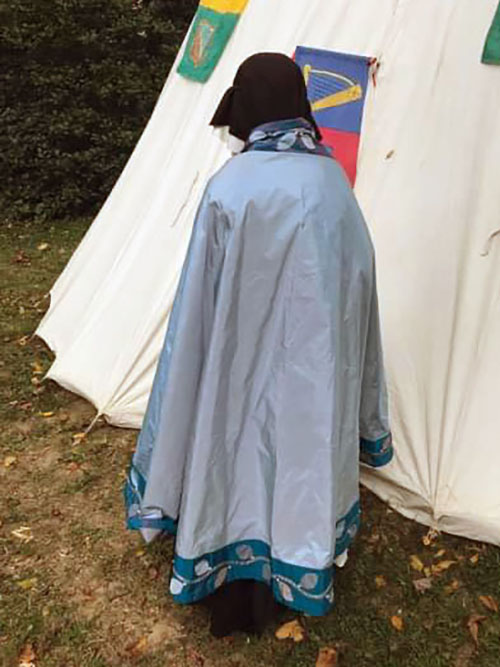
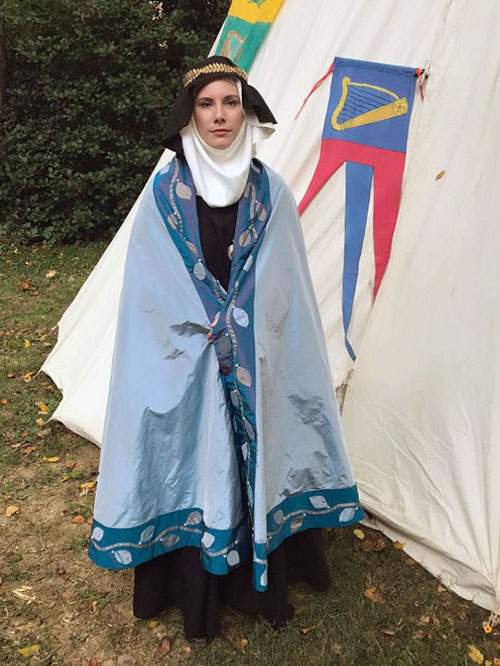
Wrote a poem! Did my first calligraphy! Threw in some illumination from the Book of Kells!
I was sick so the poem wasn’t as dramatic as I wanted it to be and the whole thing was late!
Text:
To Cuan, king of considerable worth:
Your bard begs you a brief moment
of time, attention, tolerance, and reprieve.
A report of a birthday reached my ears–
so a chronicle I conceive for the King of Atlantia,
a poem of his prowess, praising his might
with words of wisdom to warn and advise,
extolling the integrity of one .viii. times a king.
But unbidden, an illness attacked my form,
muddled my mind and mystified my pen.
Now my reason returns, revived and hale,
But the moment is missed! Mournfully thus
I weakly write a wish, with all goodwill
of a belated birthday from your King’s Bard.
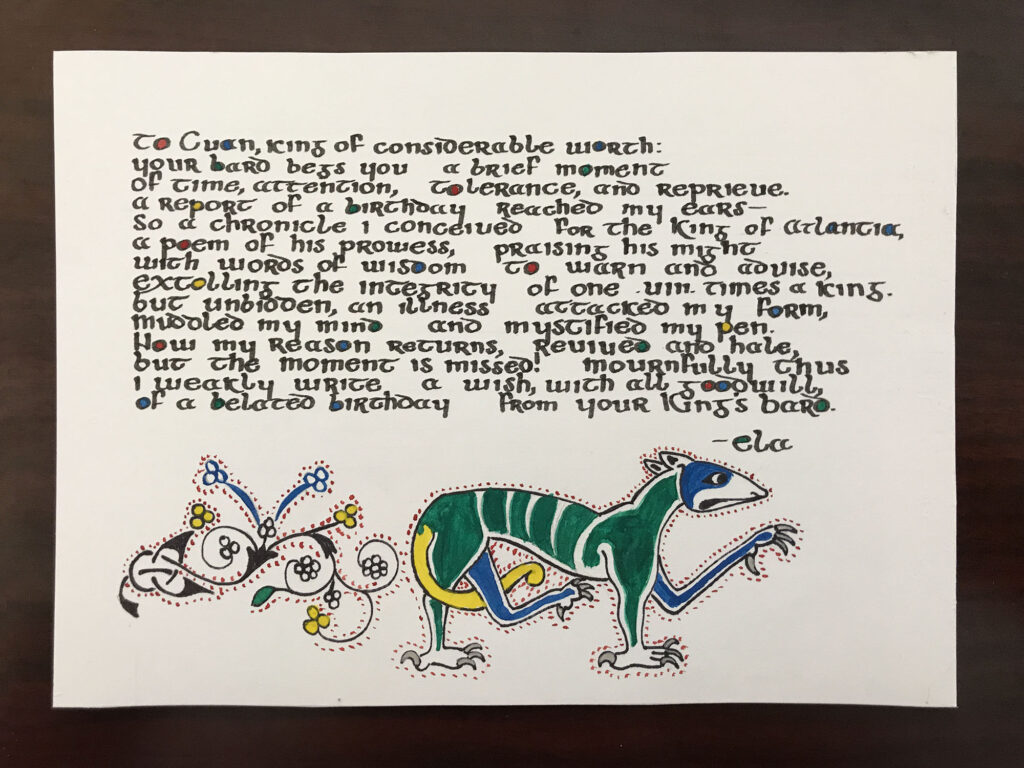
I was honored to collaborate with Lady Clara Brauer and Lady Kaaren Valravn on Thea de Nes (“Aunt Nessie”)’s Pearl scroll. Clara did the majority of the illumination and all of the calligraphy, Kaaren painted the portrait and the cherubs, and I wrote the text. You can find more pictures on Kaaren’s site.
Text:
Endless delight is found in pearls: precious prizes, their gentle beauty is formed through great toil. Know that We, Cuan and Signy, King and Queen of Atlantia, have found such a pearl in Thea de Nes. Crafting wonders from fiber, pen, paint, and bead, she shares them freely; her generosity warms Our hearts and soothes Our spirits. Thus do We induct Thea de Nes into Our Order of the Pearl. Done this 8th day of February, A.S. LIV, at Bright Hills Baronial Birthday in the Barony of Bright Hills.
